Egypt is a country steeped in rich traditions and vibrant celebrations that reflect its diverse cultural heritage. Throughout the year, Egyptians come together to honor their history, religious beliefs, and community through a variety of festivals and celebrations. This article explores some of the most significant Egyptian festivals and celebrations, providing insights into their origins, customs, and the unique experiences they offer both locals and visitors. Whether you’re planning a trip or simply curious about Egyptian culture, understanding these festivities can enrich your appreciation of this fascinating country.
Egyptian Festivals and Celebrations: A Vibrant Tapestry of Culture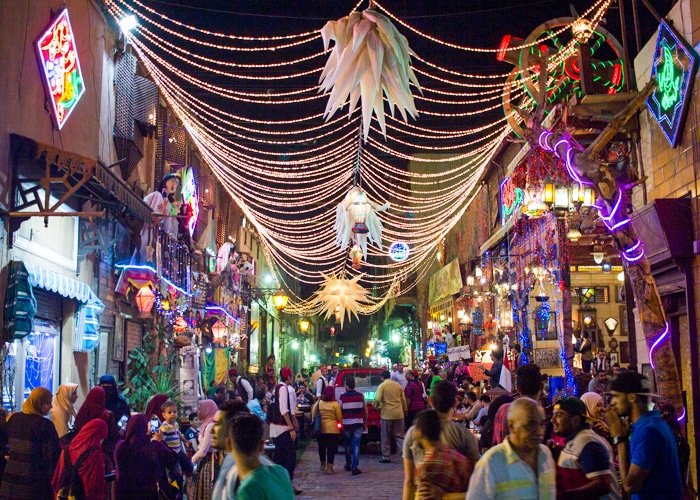
Egypt is a land of diverse and colorful festivities, reflecting its rich cultural heritage and religious traditions. The country’s festivals and celebrations are a true testament to the Egyptian spirit of joy and community. Here is a list of significant holidays, events, and festivals in Egypt that you must experience to truly understand the essence of Egyptian culture:
- Moulid Al-Nabi (in October)
- Sayeda Zeinab’s Moulid (in March)
- Pharaonic Wedding (in October)
- Wafaa Al Nil (in August)
- Moulid of El-Hussein (in October & December)
- Abu Simbel Festival (in October)
- Sham al Nessim (in April)
- Art Festival (in August)
- Eid Fitr (in May)
- Eid al Adha (in July)
- Moulid Abu el-Haggag (in July)
- Coptic Christmas in Egypt (in January)
- Egyptian National Day (in November)
Egyptian Festivals and Celebrations are not just about religious observances; they are a mix of state, religious, and private holidays that celebrate both Islamic and Christian traditions. Egyptians know how to celebrate life’s moments, big or small. Whether it’s a send-off for friends and family embarking on a pilgrimage to Mecca, or the joyful announcement of a new birth, the Egyptian way of sharing joy and sorrow is truly unique.
Discover: Egypt Travel Tips for First-Time Visitors
Most Famous Religious Festivals in Egypt
Throughout history, religion has played a significant role in shaping cultures and traditions around the world. Egypt, with its rich tapestry of history and diverse beliefs, boasts a vibrant calendar filled with captivating Egyptian festivals and celebrations. These festivals, deeply rooted in religious traditions, offer a glimpse into the soul of Egyptian culture, showcasing their faith, customs, and enduring spirit. From ancient ceremonies to modern observances, Egyptian Festivals and Celebrations provide a unique opportunity to immerse yourself in the beauty and significance of religious practices in this captivating land.
1. Ramadan and Eid al-Fitr and Eid al-Adha
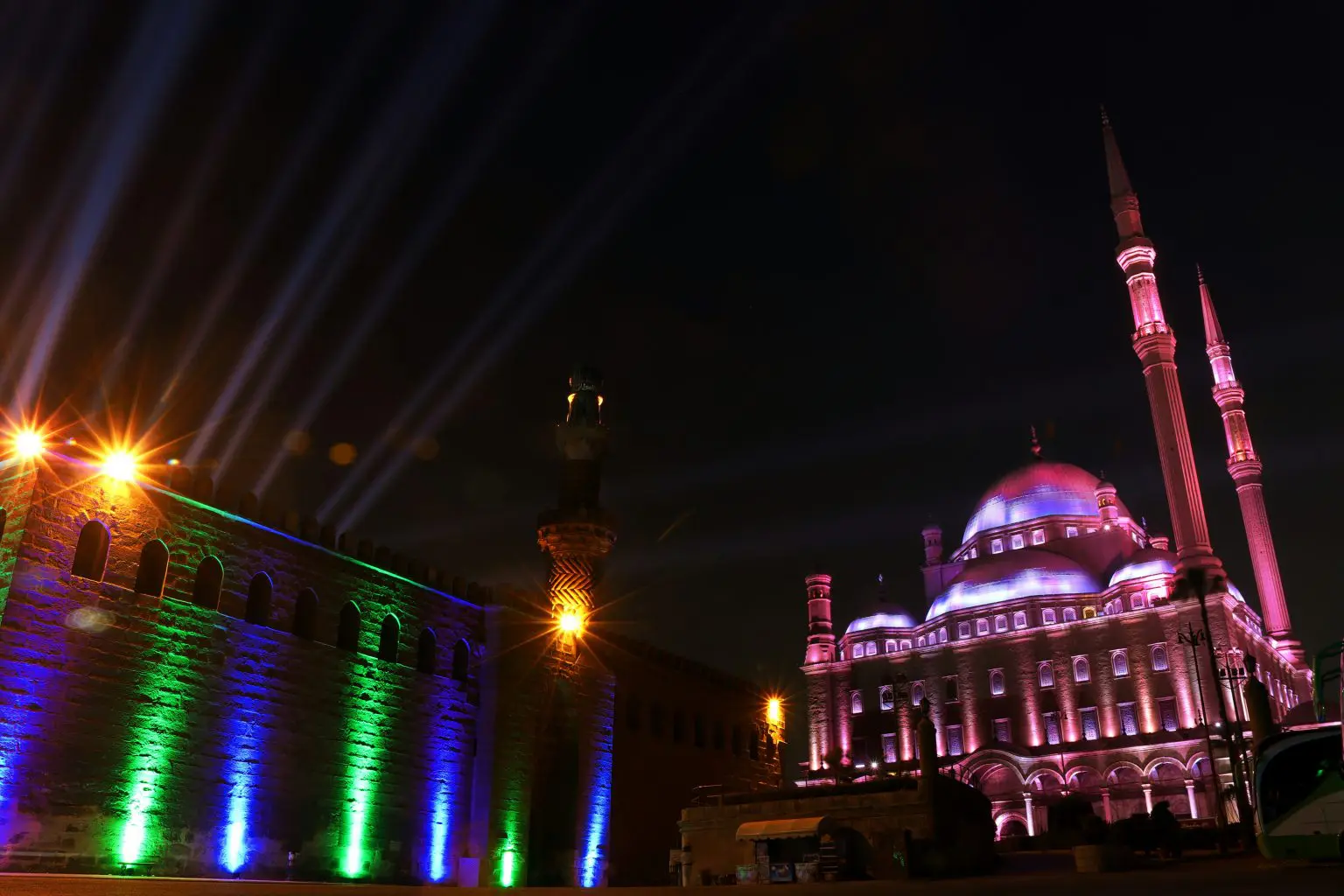
- Ramadan
Ramadan is one of the most important Egyptian festivals and celebrations, marking a month of fasting, prayer, and reflection for Muslims. During Ramadan, Muslims fast from dawn to sunset, refraining from food, drink, and other physical needs. The fast is broken each day with the Iftar meal, which often includes traditional dishes like dates, soup, and lamb.
- Eid al-Fitr
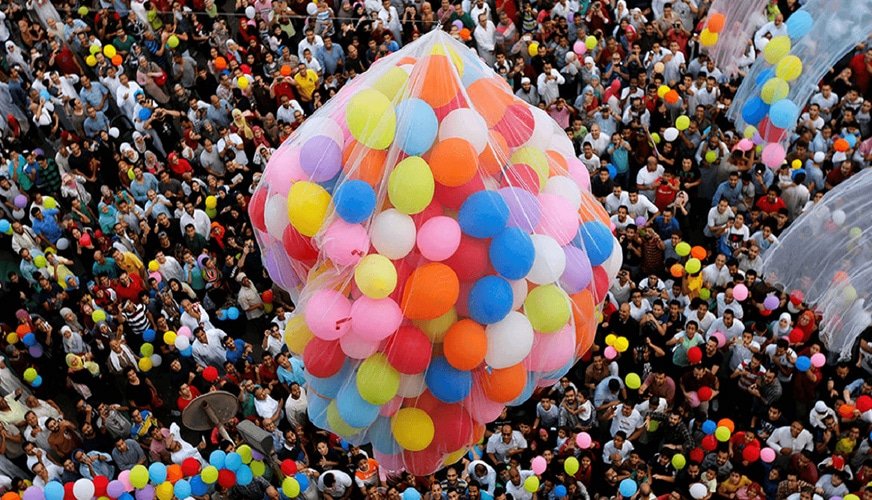
Eid al-Fitr, also known as the “Festival of Breaking the Fast,” is celebrated at the end of Ramadan. This joyous occasion involves communal prayers, feasting, and the giving of gifts. Families come together to celebrate with special meals, and children receive new clothes and presents. Eid al-Fitr is a time for forgiveness, charity, and strengthening social bonds.
- Eid al-Adha
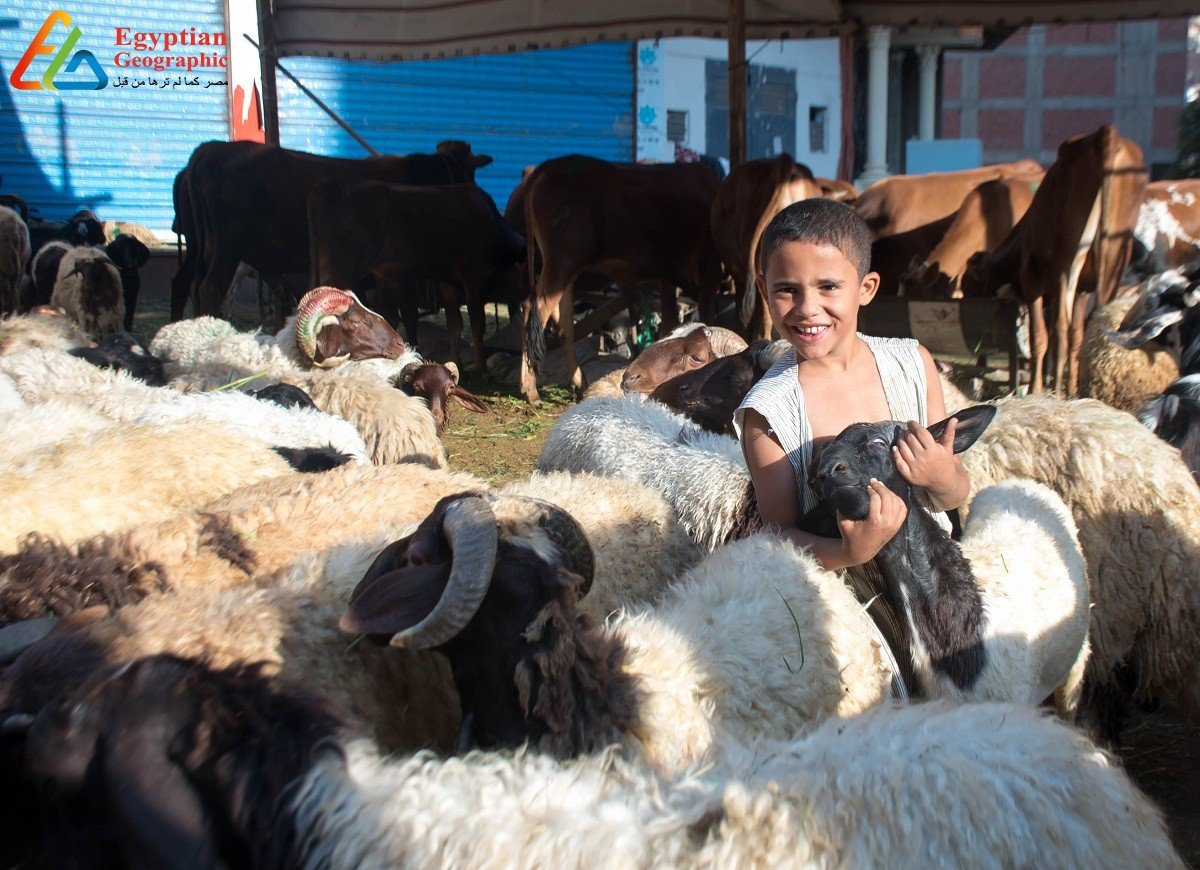
Eid al-Adha, or the “Festival of Sacrifice,” is another major religious celebration in Egypt. It commemorates the willingness of Ibrahim (Abraham) to sacrifice his son in obedience to God. Muslims around the world, including in Egypt, mark this festival with special prayers and the ritual sacrifice of animals such as sheep, goats, or cows. The meat is then distributed among family, friends, and those in need. This act symbolizes devotion, charity, and community spirit.
2. Cultural Festivals in Egypt
Egypt’s vibrant spirit shines through its captivating Egyptian Festivals and Celebrations. These cultural expressions, deeply rooted in tradition, offer a glimpse into the country’s soul. From ancient ceremonies to modern celebrations, Egyptian Festivals and Celebrations allow visitors to immerse themselves in the rich tapestry of Egyptian culture, experiencing their customs, faith, and enduring spirit.
- Sham El-Nessim
Sham El-Nessim, one of the oldest Egyptian festivals and celebrations, dates back to ancient Egypt. It is celebrated on the Monday following Coptic Easter and marks the beginning of spring. The name “Sham El-Nessim” means “smelling the breeze,” reflecting the tradition of enjoying the outdoors and the fresh spring air.
On this day, Egyptians gather in parks and along the Nile River to picnic and enjoy traditional foods such as fesikh (fermented fish), green onions, and colored boiled eggs. The festival emphasizes renewal, nature, and the joy of spending time with loved ones.
- Wafaa El-Nil
Wafaa El-Nil, also known as the “Nile Flood Festival,” celebrates the life-giving waters of the Nile River. This ancient festival, which dates back to Pharaonic times, is observed in August when the Nile traditionally floods, bringing fertility to the land.
Today, Wafaa El-Nil includes various activities such as boat races, concerts, and cultural performances. It is a time for Egyptians to honor the river’s importance in their history and daily lives, and to appreciate its role in agriculture and sustenance.
3. Cairo International Film Festival
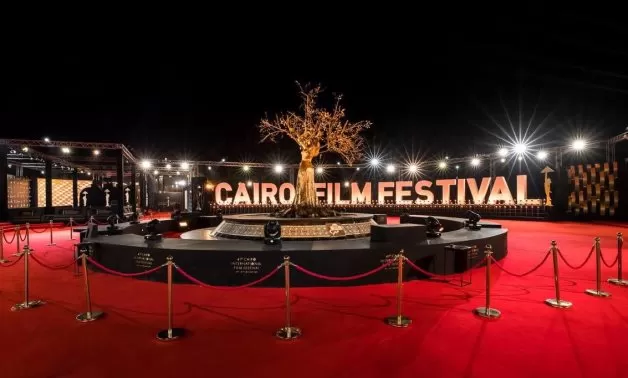
The Cairo International Film Festival (CIFF) is a prominent cultural event that showcases the best of Egyptian and international cinema. Founded in 1976, it is the oldest film festival in the Arab world and Africa. The festival features screenings of feature films, documentaries, and short films, as well as panel discussions, workshops, and awards ceremonies.
CIFF attracts filmmakers, actors, and cinephiles from around the world, providing a platform for cultural exchange and the celebration of artistic achievement. It is a key event in Egypt’s cultural calendar, highlighting the country’s contribution to the global film industry.
Top National Festivals in Egypt
Egypt’s vibrant calendar overflows with captivating Egyptian Festivals and Celebrations. These celebrations extend far beyond religious traditions, encompassing national pride and jubilant displays of victory. From commemorating historical triumphs to erupting in joyous cheers for sporting championships, Egyptian Festivals and Celebrations pulsate with the rhythm of a nation united in its spirit and love for life.
1. Revolution Day
Revolution Day, observed on July 23, commemorates the 1952 Egyptian Revolution, which led to the establishment of the modern Republic of Egypt. This national holiday is marked by military parades, patriotic displays, and various public events.
The day serves as a reminder of Egypt’s struggle for independence and its ongoing journey towards progress and development. It is a time for Egyptians to reflect on their history and honor the sacrifices made for their nation’s freedom.
2. Sinai Liberation Day
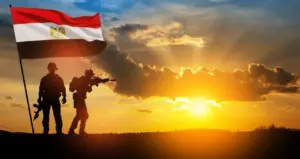
Sinai Liberation Day, celebrated on April 25, marks the withdrawal of Israeli forces from the Sinai Peninsula in 1982, following the Egypt-Israel Peace Treaty. This day is significant as it represents the return of Egyptian sovereignty to the Sinai region.
The celebrations include military parades, cultural events, and educational programs that highlight the historical and strategic importance of the Sinai Peninsula. It is a day of national pride and a testament to Egypt’s resilience and determination.
Limitless Egypt – Book Today
A captivating journey through time and history, allowing you to explore the country’s ancient wonders, vibrant cities, and natural beauty. This tour typically spans several Days, providing ample time to immerse yourself in Egypt’s rich cultural heritage.
Traditional Celebrations in Egypt
Despite being a predominantly Muslim nation, Egypt boasts a remarkably diverse religious landscape. This rich tapestry is beautifully reflected in the vibrant calendar of Egyptian festivals and celebrations. From the joyous festivities of Mulid al-Nabi, celebrating the birth of Prophet Muhammad, to the solemn observances of Coptic Christmas, Egyptian Festivals and Celebrations showcase the harmony with which various faiths coexist in Egypt. These events offer a fascinating glimpse into the soul of Egyptian culture, highlighting their deep respect for tradition and their ability to celebrate life’s milestones together, regardless of religious background.
1. Mawlid al-Nabi
Mawlid al-Nabi, or the Prophet Muhammad’s Birthday, is a significant religious festival for Muslims in Egypt. It is celebrated on the 12th day of Rabi’ al-Awwal, the third month of the Islamic calendar. The festivities include recitations of the Quran, religious songs, and street procession.
In Egypt, the celebration is marked by the distribution of sweets, such as honey-soaked pastries and a special candy called ‘halawet al-mulid.’ It is a time for spiritual reflection, community gatherings, and acts of charity.
2. Coptic Christmas
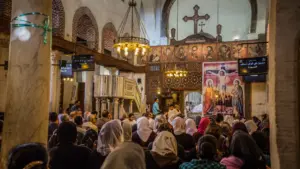
Coptic Christmas, celebrated on January 7, is a major religious festival for Egypt’s Coptic Christian community. The celebration begins with a special church service on Christmas Eve, followed by a festive meal with family and friends.
Traditional foods such as fattah (a dish of rice, bread, and meat) and kahk (sweet biscuits) are enjoyed during the celebrations. Coptic Christmas is a time for prayer, family reunions, and expressing gratitude for the blessings of the past year.
3. Abu Simbel Sun Festival
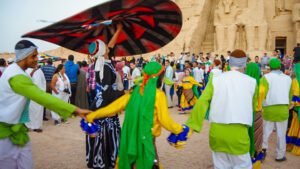
The Abu Simbel Sun Festival is a biannual event that takes place at Abu Simbel temple, one of Egypt’s most iconic archaeological sites. The festival occurs between February 22 and October 22, marking the dates when the sun’s rays illuminate the inner sanctuary of the Great Temple of Ramses II.
The phenomenon attracts visitors from around the world who gather to witness this ancient marvel. The festival includes traditional music, dance performances, and cultural activities that celebrate the ingenuity and grandeur of ancient Egyptian civilization.
When is the Best Time to Visit Egypt?
Modern Egyptian Festivals and Celebrations
Modern Egypt pulsates with a vibrant calendar of Egyptian Festivals and Celebrations that extend beyond traditional religious observances. These contemporary events showcase the dynamic spirit of the nation, from the electrifying countdown of New Year’s Eve to the heartwarming traditions of Easter.
1. New Year’s Eve
New Year’s Eve is celebrated with great enthusiasm in Egypt, particularly in major cities like Cairo and Alexandria. The festivities include fireworks, concerts, and parties that continue well into the night. Hotels, restaurants, and clubs offer special events and packages to mark the occasion.
For many Egyptians, New Year’s Eve is a time to reflect on the past year and make resolutions for the future. It is a celebration of hope, renewal, and the promise of new beginnings.
2. Easter
Easter is celebrated by both the Coptic Christian community and the broader Egyptian society. Coptic Easter, which often falls on a different date than Western Easter, includes church services, feasting, and family gatherings. Traditional foods such as roasted lamb, colored eggs, and various pastries are enjoyed during the celebrations.
The holiday is a time for spiritual reflection, joy, and spending quality time with loved ones. It is a significant religious and cultural event that highlights the diversity of Egypt’s population.
Local Egyptian Festivals and Celebrations
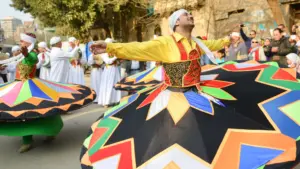
Stepping beyond the realm of deeply rooted religious traditions, Egyptian Festivals and Celebrations also embrace the vibrancy of modern life. These contemporary events showcase a different facet of Egyptian culture, one that thrives on joyous revelry and shared experiences. From the electrifying countdown to the new year to the heartwarming traditions of Easter, Egyptian Festivals and Celebrations offer a glimpse into the dynamic spirit of modern Egypt.
1. Siwa Oasis Date Festival
The Siwa Oasis Date Festival is a unique celebration that takes place in the Siwa Oasis, a remote and culturally distinct region of Egypt. The festival, held in October, marks the date of harvest season and includes various activities such as traditional music, dance, and competitions.
The highlight of the festival is the date-picking contest, where participants compete to harvest the most dates. The event provides an opportunity for locals and visitors to celebrate the rich agricultural heritage of the Siwa Oasis and to enjoy its unique cultural traditions.
2. Luxor African Film Festival
The Luxor African Film Festival (LAFF) is an annual event that celebrates African cinema and culture. Held in the historic city of Luxor, the festival features screenings of films from across the African continent, as well as workshops, panel discussions, and cultural performances.
LAFF aims to promote African filmmakers and to foster cultural exchange and understanding between Egypt and other African nations. It is a significant event that highlights the artistic and cultural diversity of the African continent.
Egyptian festivals and celebrations offer a vibrant tapestry of cultural, religious, and national traditions that reflect the rich history and diverse society of the country. From ancient rituals to modern festivities, these events provide unique insights into the values, beliefs, and communal spirit of the Egyptian people.
For the best experience exploring these festivals, book your trip with TravMe.
We offer detailed guides, practical tips, and personalized itineraries to help you immerse yourself in Egyptian festivals and celebrations. Discover the magic of Egypt’s cultural heritage and create unforgettable memories with TravMe. Book your next adventure with us today!
Read More


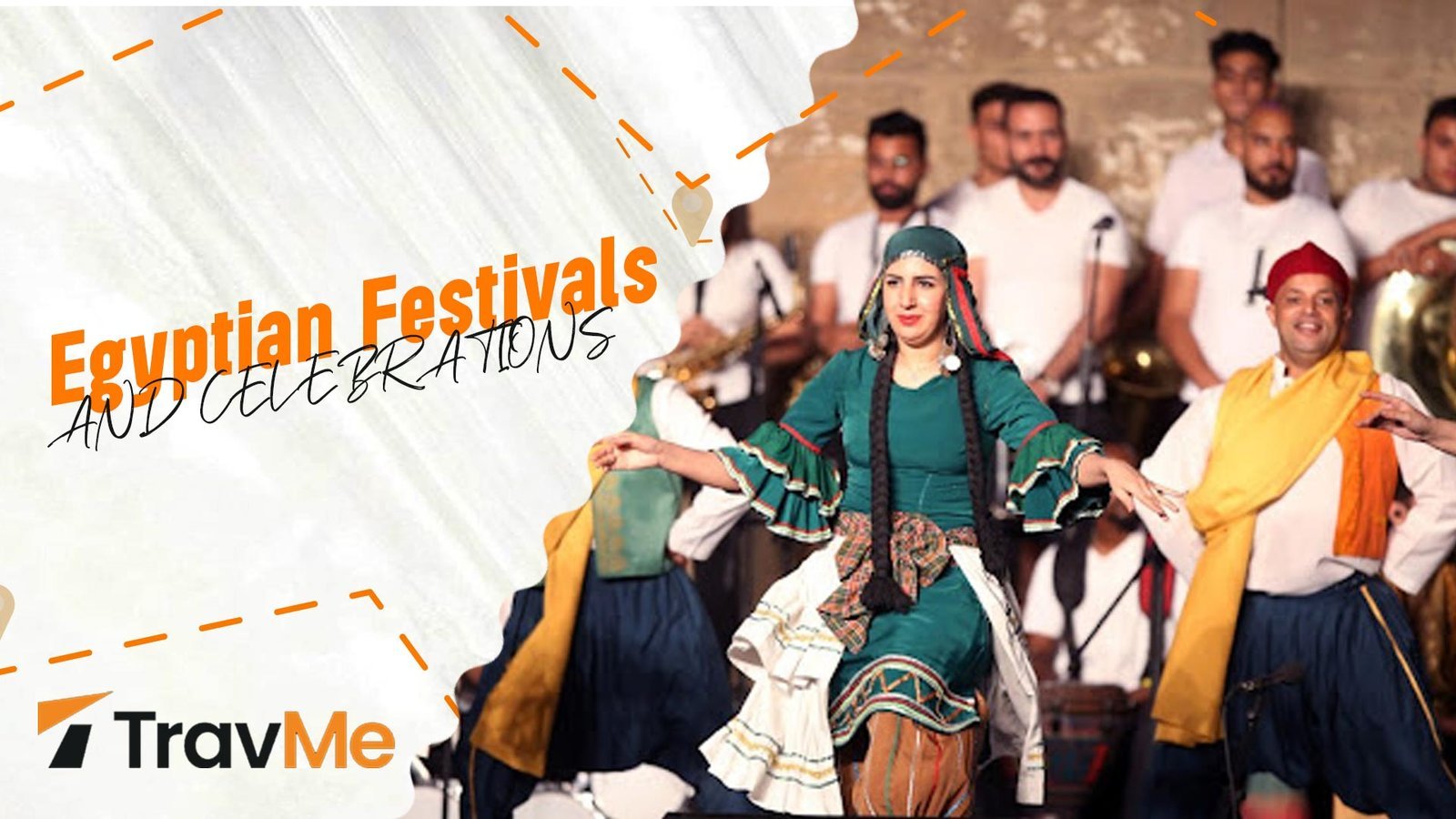
Comment (0)